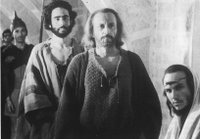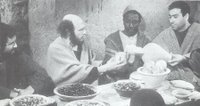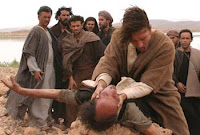
When reading Acts of the Apostles in the Bible, it's easy to forget that the events it describes took 30 years to unfold. Aside from the prologue Luke's gospel spends 24 chapter on the events of just 3 years, and the immediacy of his writing style changes little between parts 1 and 2 of his story about Jesus and his followers.
Films about Acts have tended to reinforce the speed with which we perceive the events occurred. With 28 chapters to cram into just a few hours it's difficult to carve out the space to show time ebbing along.
Rossellini's
Atti Degli Apostoli (1968), however, bucks the trend. Whilst including a great deal of the biblical material (only chapter 19 and 24 are completely omitted), it still manages to convey the slowness of the process which led to Paul's arrival in Rome.
Rossellini does this by utilising a number of different techniques, many of which pull against the epic film genre. Large crowd scenes are kept to a minimum, as are on-screen depictions of miracles (although there are examples of both, particularly at the start of the film). Acts' many sermons are delivered in a low key style rather than converted into the kind of rousing speech that is so typical of the epic. Further more, most of the apostles' evangelism consists of one on one conversations, or talks in front of small groups, perhaps in a remote synagogue. The production opposes the epic in other ways, for example, it usually underplays the hero's persecution and refuses to import romantic sub-plots.

There are a number of other ways in which the film creates this more leisurely pace. Firstly, Rossellini punctuates his action with moments where nothing is really happening. There is space in this film, often at the start or the end of a shot. In some ways these moments of space are unnecessary; but in other ways they are the very essence of the film.
There's a masterful shot at the start of the seventh episode
1 which starts with a close up of a deserted dust track. The shot ever so gradually widens as the camera pulls back, eventually incorporating Paul and Barnabas as they trek up the road to Pisidian. It's one of many examples of Rossellini's Pancinor zoom technique – the long shots which zoom in and out drawing attention to various parts of the scene but keeping them connected to the larger whole. Here it starts with the emptiness of a remote path and then locates Paul and Barnabas on it. The shot as a whole tells the story of a long quiet walk along a deserted road.
Prior to this point in the film the action has centred around a busy Jerusalem, with only brief forays into the outside world. But from here on in, Paul becomes the main protagonist, and he and his companions pursue a lonely course of action through the towns of Asia Minor. Even the council of Jerusalem occurs outside the actual city itself.
The second way in which this film implies a more protracted timescale is by stressing how isolated Paul and the other disciples are from each other, and how unaware they are of the impact they are having. When Paul meets a besotted Prisicilla and Aquilla he is stunned to discover that he, and his Lord, are already well known in Rome. As he nears the great city in the closing scenes, he is again taken aback to find he is known and admired by a sizeable Christian community.
The great strength of these scenes is how emotionally powerful they are given their apparent restraint and understated acting. Somehow the numerous subtleties of the performances and the way they are filmed add up to something quite moving. Another example of this is disciples' reunion at the council of Jerusalem. Before launching into the debate about gentile adherence to the law, Rossellini pauses to show Peter waiting for the other delegates. But rather than being absorbed with the business the council needs to attend to, it seems he's mainly looking forward to seeing his friends and brothers again.

The film's ultra-long takes are, in themselves, another way in which the film suggests the passage of time. Perhaps the majority of scenes in
Atti are filmed in a single, extended, shot. There are of course exceptions, notably the food riot in Jerusalem where the montage is perhaps a formal way of underlining that this particular episode is fictional, but these only serve to remind us of the longer takes elsewhere.
Filming a scene in a single shot gives the cuts between these scenes extra significance. Within a shot the action occurs in real time. Once that continuity is broken the time that has passed whilst the camera has been turned off is unknown and potentially, therefore, represents an extended period.
Commentators have suggested a number of reasons why Rossellini relied so heavily on the long shot, (accompanied by the Pancinor zoom and the
plan séquence). For some writers it was simply economy – long shots reduced the post production editing process to simply joining the scenes in the correct order, whilst also reducing the time and money spent altering lighting and make up for each scene. Other commentators, however, whilst perhaps accepting those particular advantages also see it as a way of giving the film more realistic aesthetic, and allowing the films to be more neutral.
By this stage in his life Rossellini was firmly into his historical period, producing films that he thought would "aim human beings in becoming more rational".
2 To this end he had reverted to making films for television where "the [critical] spirit of the individual is more accentuated".
3 Rossellini's desire for historicity is apparent throughout the series. Almost the entire first episode consists of an enslaved scribe giving a Roman noble a tour of Jerusalem along with a social and historical commentary. Elsewhere the rise and fall of the various Caesars is introduced into the relevant part of the script.

There is also a great deal of the everyday in
Atti. The apostles spend a great deal of time engaged in manual labour. Peter is shown dyeing, Paul weaving, Stephen serving food and so on. Often the disciples spread they gospel as they work, a theme that would reappear in
Il Messia.
That said Rossellini's concern is not so much with a detailed recreation of the period as of the particular work in which he is adapting. This also apparent with his other historical works which are also adaptations of historical artefacts. So whilst the costumes and locations are fairly realistic, these areas are not attended to as rigorously as they are in many historical films today. The aim is to recreate (the feel of) the work rather than the events the work discusses.
This is one of the reasons why so many of the miraculous stories are not shown directly. This is simply a feature of Luke's work which Rossellini is seeking to recreate. Yet Rossellini relies on characters recounting supernatural occurrences more than Luke. Whilst this might appear to be an inconsistency, it only reflects the manner in which the story has been heard ever since.
There are two further reasons why Rossellini portrays the miracles in this manner. Firstly, describing the miracles is far more ambiguous than showing them. This allows the viewer to approach them from their own perspective, without forcing a particular opinion. Secondly, it recontextualises them. Set in a fresh context they once again become startling, like they were for their original audiences, liberated from the confines of familiarity.

This recontextualisation is also seen in some of the speeches made by the apostles. "In these films, characters boldly foreground their words, paradoxically, by delivering them in a flattened, often completely uninflected way... [focussing attention] on the ideas and historical forces at work".
4Another way in which the film may be seen to be at variance with the book is in its great respect for the Judaism of the period. The lengthy prologue places the narrative firmly in a broader context explaining, for example, that Christianity was only one of a number of Jewish sects. It is also keen to stress the Judaism of the early apostles. Prior to his conversion Saul is shown sitting in the Sanhedrin, and even after his trip to Damascus he retains his side curls.
There are also points where the film questions Paul's
modus operandi of using the network of synagogues to promulgate his message. Is he taking advantage of the hospitality which he is shown? Do the Hebrews (as the film generally calls them) in that town have good reason not to abandon their faith for his?
Such questioning should not be seen as an outright criticism of Paul. Indeed his dedication and his genuineness come across very clearly. Perhaps the biggest slur against him is the irritating American drawl used to dub the film into English.
Fortunately, the visuals are so brilliantly memorable that they persist in the memory long after the poor dubbing has faded into obscurity. As with the book, the precise words used by the apostles may no longer be recoverable, but the impact of what they achieved endures.
1 - The version of the film I saw was the ten episode "catechical" version. There is also a 5 episode version of this film (where each section is just short of an hour) where this shot should occur at the beginning of episode 4.
2 – Brunette, Peter. "Roberto Rossellini", University of California Press (1996) p. 253
3 – Interview, Filmcritica, no 190 (Aug 1968), 351 – cited in Brunette
4 – Brunette, Peter. "Roberto Rossellini", University of California Press (1996) p. 262
 Just Heard from The Guardian that legendary Sewdish Director Ingmar Bergman has died aged 89. He was one of the few directors in the history of film making that genuinely deserved the label "legend", making films for over half a century, continuing to direct films into his 80s with 2003's Saraband.
Just Heard from The Guardian that legendary Sewdish Director Ingmar Bergman has died aged 89. He was one of the few directors in the history of film making that genuinely deserved the label "legend", making films for over half a century, continuing to direct films into his 80s with 2003's Saraband.
































